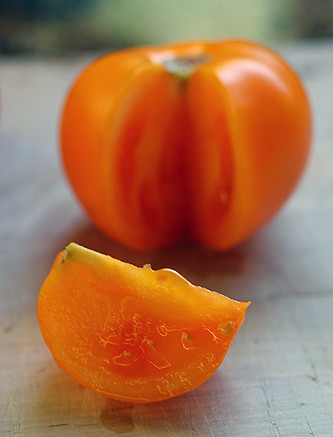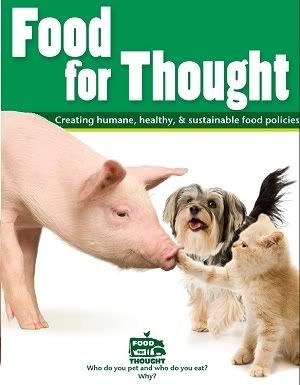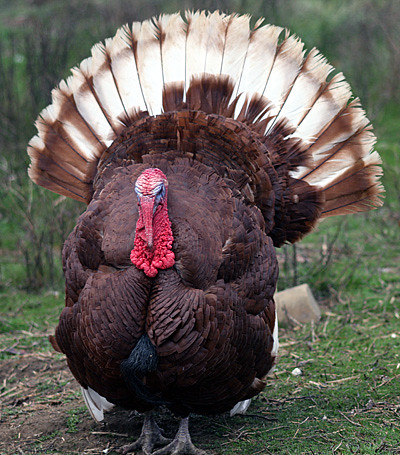
Here's Sadie, vintage style.
Sadie will be turning 11 this March. She has been at the sanctuary for four years and has really blossomed from a shy, abused dairy cow to a lover of back scratches and apples.

 Researchers at the University of Liverpool believe that increasing your consumption of nuts, veggies and fruits may reduce the likelihood of age-related macular degeneration (AMD) by up to 20%.
Researchers at the University of Liverpool believe that increasing your consumption of nuts, veggies and fruits may reduce the likelihood of age-related macular degeneration (AMD) by up to 20%. Animal Place's Food for Thought campaign asks animal shelters who rescue dogs and cats to create a menu policy that is consistent with their ethics.
Animal Place's Food for Thought campaign asks animal shelters who rescue dogs and cats to create a menu policy that is consistent with their ethics. The February issue of SELF includes a positive article on vegetarianism called Veg out! You can read the article here.
The February issue of SELF includes a positive article on vegetarianism called Veg out! You can read the article here.
Yesterday, I attended Humane Lobby Day at the state capitol in Sacramento. The intent behind lobby day is to give constituents a chance to meet their representatives and promote a few bills that improve the welfare of animals.
Turnout was great, maybe a 100 or more people whose impetus for coming was that they cared about animals.
I attended with trepidation as did many other first-time attendees.
While I’m familiar with the legislative process and the how of lobbying, I haven’t done much of it. Like so many others, I forget that representatives are there for us – literally. We pay their salaries, we pay for their offices and we pay for the maintenance of the state capitol building, why shouldn’t we express our viewpoints, concerns and accolades (or disappointments)?
California’s state capitol is beautiful, so it wasn’t hard to enjoy my first meandering moments until I found the correct room. The basics of lobbying and legislation were covered, as well as the three bills we would be promoting to our representatives (or in most cases, their staff and aides).
Then it was time for lobbying. While lobbying isn’t as scary as it sounds, no one really wants to do it by themselves. So, for the most part, everyone had a partner (some districts had groups of 6 or more!). One of my partners was a soft-spoken woman from Fort Bragg whose sole reason for attending was her love of animals. She drove out on her own, overcoming her public speaking fear to help animals. My other partner was a very gregarious woman from Sonoma County – she had even visited the sanctuary and met Howie (she was appropriately impressed by his awesomeness). I think we made a great team!
I would strongly encourage you to attend a lobby day event in the future. It’s incredibly insightful and - I swear I’m not making this up - actually fun. You will meet new people and make new connections. And most importantly, you will be putting your compassion into action!
While Humane Lobby Day for California is over until next year, there are still upcoming lobby day happenings in other states – find out if your state has a humane lobby day here.
In the upcoming days and weeks, we’ll be promoting some bills that affect animals and asking you to contact your legislators. Keep an eye out for a bill that would outlaw the tail docking of cattle!
And remember – you pay their salary, you deserve to have your voice heard. If you won’t do it for yourself, do it for the animals.
-Marji Beach, Education Coordinator
 Here's Gillian on a Very Important Mission (VIM). Her VIM turned out to be stalking me and seeing if my camera was edible. It was not but I admired her dedication to the cause.
Here's Gillian on a Very Important Mission (VIM). Her VIM turned out to be stalking me and seeing if my camera was edible. It was not but I admired her dedication to the cause. Here is Sarah who does not like to eat cameras but does like to walk around strutting her stuff. She is one cool chicken!
Here is Sarah who does not like to eat cameras but does like to walk around strutting her stuff. She is one cool chicken! Three former Aviagen Turkey workers have been indicted on 19 counts of animal cruelty, 11 of them felony level charges.
Three former Aviagen Turkey workers have been indicted on 19 counts of animal cruelty, 11 of them felony level charges.The video shows an experiment at the University of Zurich involving a pig that was conditioned to feed in an isolated and sealed space. On a given day, however, the pig is greeted not with its usual plate of food, but a gradual stream of the carbon dioxide gas anesthetic instead. Footage shows the pig frantically jumping up and down trying to breath, until it drops down exhausted. After the anesthesia wears off the pig refuses to reenter the room to be fed and opts instead to go without food and water for three days.And
According to the largest slaughterhouse company in Europe, Vion, both methods have their downsides. Electrocution is quick, but has to happen to each pig individually. Whereas a gas anesthetic takes 10 to 20 seconds, but the abattoir can anesthetise the pigs in groups, thereby removing the need to separate the social animals from their groups.The biggest downside? Ask the pig.
 Leland: 3/13/1998 - 1/31/2009
Leland: 3/13/1998 - 1/31/2009